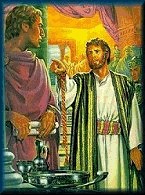 |
 |
|
Is it not true that Jeremiah 25:18 indicates that Jerusalem and the cities of Judah had already become "a devastated place, an object of astonishment" by the fourth year of Jehoiakim, the first year of Nebuchadnezzar? No, this is nothing more than a misconception held by some critics. Jeremiah 25:1, 2, 17, 18 reads as follows:
Certain individuals have misapplied the words "just as at this day" as an indication that Judah was already considered a devastated place by the fourth year of Jehoiakim. However, Jeremiah is here writing about the prophecy that occurred to him in the fourth year of Jehoiakim. In no way does this imply that Jeremiah chapter 25 is being written in this year. Rather, it is a narration of the events that took place in that year. In Bible translations that include quotation marks where appropriate (e.g. NWT, NIV, RSV, By, NKJV), one will notice that the verses that follow verse 2 are enclosed in quotation marks. It will also be noted that verses 17 to 23 of Jeremiah chapter 25, which contain the words in question, are not enclosed in quotation marks, as are the majority of verses in chapter 25. This is because verses 17 and 18 are part of the narrative written after Judah had been laid desolate. Thus, the words "just as at this day" refer to the time when Jeremiah 25 was written down (i.e., after the destruction of Jerusalem) and therefore, not in the fourth year of Jehoiakim which refers specifically to the events being narrated.
|
| Home
| Contents Last revised: 97/11/09. Copyright © 1997 by Jehovah's Witnesses—Setting the Record Straight. All rights reserved. This web site is not affiliated with or sanctioned by the Watchtower Bible and Tract Society. However, every effort has been made to adhere to the current views published by the "faithful and discreet slave" (Matthew 24:45; Luke 12:42) through the Watchtower Bible and Tract Society. The "Official Web Site of Jehovah's Witnesses" can be found at http://www.jw.org, and should be recognized as the authoritative source about the beliefs, teachings, and activities of Jehovah's Witnesses. |